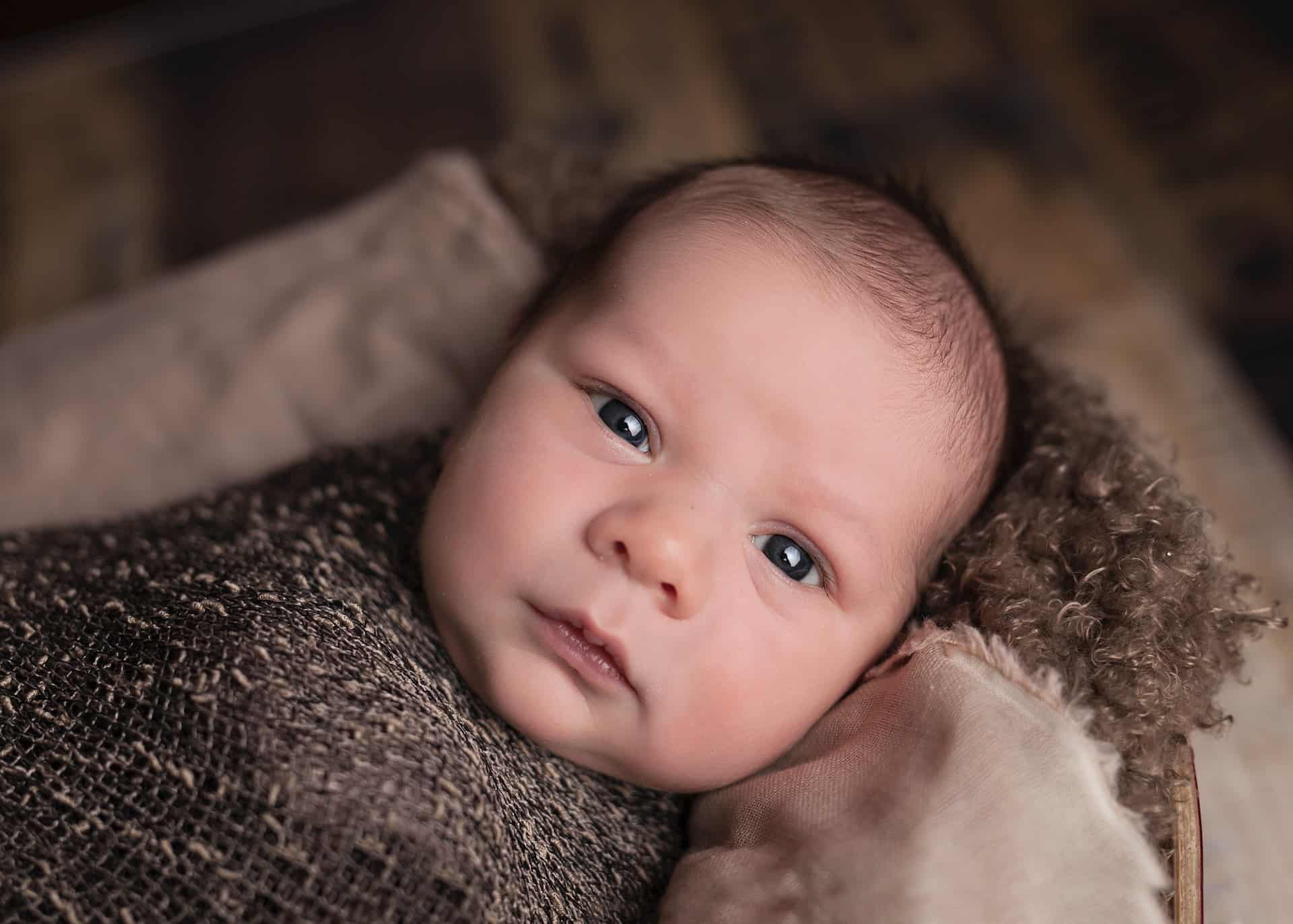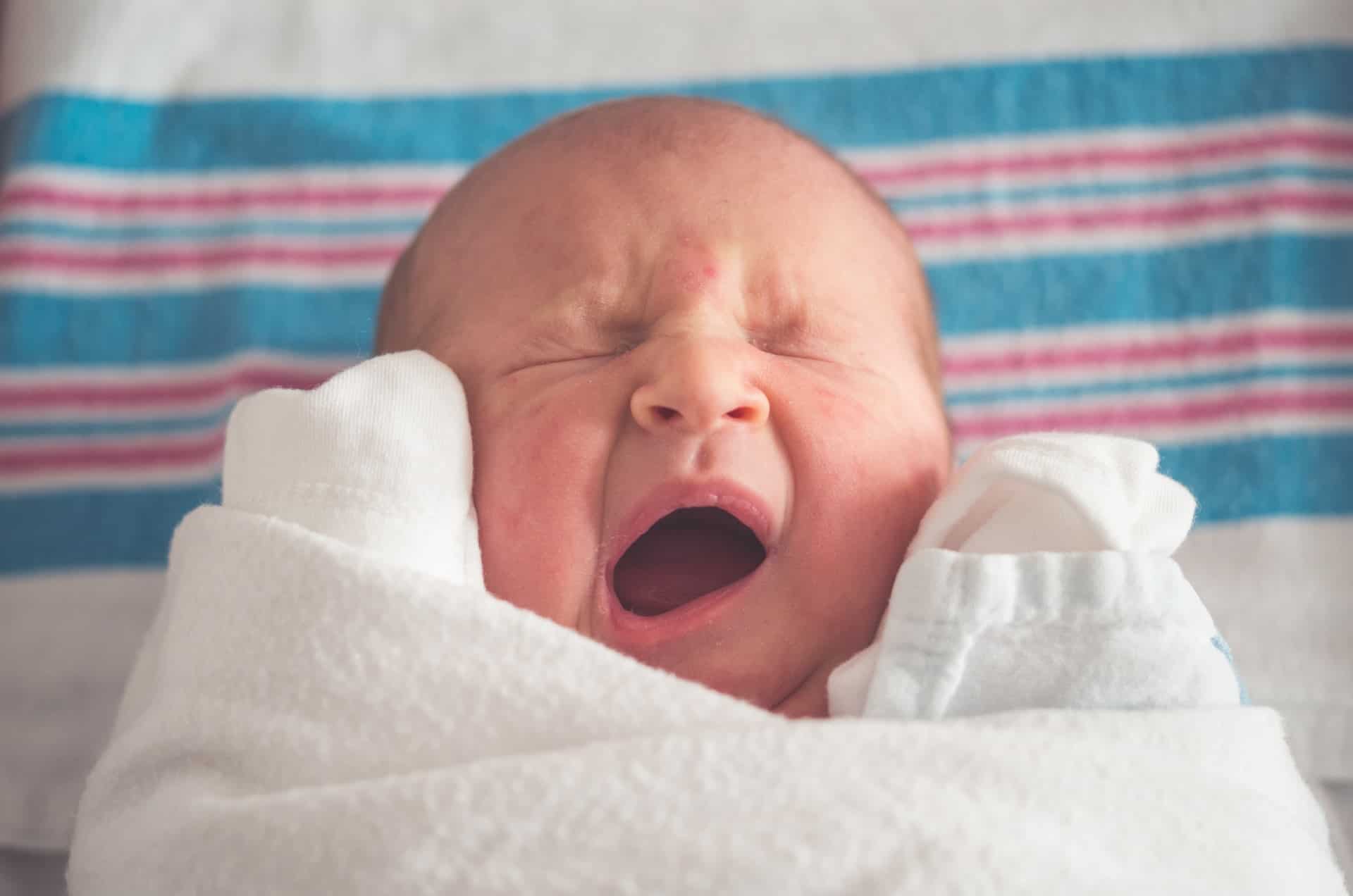If you are currently expecting or have a baby, you likely have heard the term sleep regression; and may be wondering what is sleep regression. As a Certified Pediatric Sleep Consultant, Registered Nurse, and mama of two (fresh into the toddler stage), I am here to explain sleep regressions; why they occur, when to expect them, and how we can handle them.
Bottom Line: A sleep regression is a period a baby or toddler’s sleep pattern changes. Often seen with difficulty falling asleep at bedtime or for naps, increased frequency of night wakings, difficulty falling back asleep at night, and early morning rising.
Sleep regressions can be extra frustrating if you have worked on healthy sleep habits and your baby has been sleeping through the night for some time; all of a sudden it feels like sleep has turned upside down. Having the proper education and tools, you can navigate regressions with ease and confidence.
How Long Do Sleep Regressions Last?
Sleep regressions can last 2-4 weeks, resolving within six weeks. The more consistent you are as the parent, the sooner we see sleep regressions improve. Not every parent will notice a sleep regression. For example, some of my clients have said the well-known 4-month sleep regression never occurred for them. Likely due to the fact their baby was set up with a great sleep foundation before the 4-month mark, and the parents were one step ahead of the game with total sleep needs.
Meaning the parents were adjusting wake windows and daytime routine regularly; by the time the 4-month mark approached the baby did not show signs of needing a schedule adjustment. Therefore the baby continued to sleep soundly at night.
What Causes a Sleep Regression?
It would be easier if only one main culprit for sleep regressions existed, in baby fashion, we see multiple potential reasons that can cause a sleep regression. Below you will see the main reasons sleep regressions occur:
Shift In Sleep Cycles – accompanied by the well-known 4-month sleep regression. Why it occurs; babies around 4 months of age have a developmental change in their sleep segments. Newborns have two sleep stages which will shift to four sleep stages anytime after 12 weeks of age. Therefore, babies’ sleep cycles mature once they are over 12 weeks, causing increased wakings at night.
This is a developmental milestone and one we can not avoid. When your baby can fall asleep independently, they have a much easier time connecting to the next sleep cycle during each shift throughout the night.
Shift In Sleep Needs – on average, our newborns need 16-20 hours of sleep in 24 hours, whereas we see this total decrease to 15.5 hours in 24 hours for a 4-month-old. Why it occurs, our babies are growing and changing, needing less sleep as they get older. If they oversleep during the day (above-recommended daytime sleep average) night sleep can be impacted, causing an increase in night wakings.
Developmental milestones – we see different periods of developmental milestones such as; learning to roll, crawl, pull up, walk, and talk, among many others. As it occurs with each developmental leap, our babies and toddlers are eager to learn. Therefore, it can impact their ability to calm down and relax in the middle of the night. They often practice these skill sets when they should be sleeping.
Growth Spurt – growth spurts can cause an increase in the need to eat if our babies are not consuming proper daily caloric intake, this would impact their ability to sleep soundly at night. Why it occurs, our babies are growing at such rapid speeds in the first few years of life, without calories during the day they would wake at night to make up for it. Making sure we are maintaining full feeds during the day can help eliminate the need to consume calories in the middle of the night.
Separation Anxiety – may surface as early as 4-5 months of age but is most noted around the 9-month mark. Why it occurs, babies are learning all about object permanence. Once they realize when you are out of the room, that means you are gone, it can be upsetting to your little one.
Expert Sleep Tip: focus on playing games revolving around objects permanently during wake time and incorporate using their cot/crib to play peek-a-boo.
Change In Routine – if your baby or toddler has a change in routine, such as starting daycare or having a childcare provider come into the home, this can impact their regular sleep schedule. Why it occurs, just as I mentioned above, your little one can start to experience separation anxiety with a change in routine or they may not be sleeping as well during the day because of this change, negatively impacting their nighttime sleep.
Teething – all babies will have periods of teething during the first few years of life. Why it occurs, teething can cause pain due to the inflammation of their gums. The pain can negatively impact their ability to sleep soundly.
Expert Sleep Tip: provide pain relieving medication before placing your little one down at bedtime to help alleviate their pain. If you are ever unsure of the proper dose or frequency of medication administration, please consult with your healthcare provider.
Travel – we all love a good trip until it disrupts our baby or toddler’s ability to sleep well at night. Why it occurs, travel days can be long, stimulating, and wreak havoc on their daytime naps, all these factors can impact their ability to sleep well at night and play into a sleep regression. In addition, sleeping in an unfamiliar place can bring about separation anxiety.
Illness – if your little one has a fever or experiences a head cold, this may negatively impact their sleep. Why it occurs, if we are feeling unwell from nasal congestion or a never-ending cough, we often note difficulty sleeping, this same rule applies to our little ones. Also, babies can not take over-the-counter medication to alleviate plugged sinuses. It can be hard to sleep on your back with all that congestion.
Expert Sleep Tip: purchase an electric snot sucker, it will become your best friend to help remove built-up mucous, making it easier for your little one to sleep soundly. Additionally, purchase a baby-friendly chest rub.
Signs of Sleep Regressions Include
These are the common red flags you are in a sleep regression.
- Difficulty falling asleep at bedtime
- Protesting naps or missing altogether
- Increased night wakings
- Early morning wakings (out of the norm for your little one)
Frequency of Sleep Regressions
As mentioned, we can see sleep regressions multiple times in the first few years of life. In all honesty, you can expect a shift in sleep needs every 4-6 months. Due to developmental leaps, teething, and a decrease in sleep needs, these are the most well-known periods a sleep regression can occur.
3-4 Months – the most well-known sleep regression, as mentioned above we see a maturing of sleep cycles but with this comes increased wakings. If your baby falls asleep being rocked or feed to sleep, when they wake which naturally will happen, they may have created a connection with needing this exact method to fall back asleep. We often see crying upon these wake ups, parents are tired and unsure what to do so they provide motion to help the baby fall back asleep which can create a domino effect. This is often when we see parents rocking their baby back to sleep 4-6+ times a night.
6 Months – we see babies becoming more active at this age and a growth spurt occurs. If your baby is waking out of hunger, check on its daytime calories. If you have yet to start introducing solids, now is the time to introduce solids and make sure they are getting what they need calorie-wise. Babies at the 6-month mark no longer require feeds in the middle of the night.
8-9 Months – the sleep regression is linked with separation anxiety. Our great little sleeper is now screaming as we approach their sleep space or as soon as we have placed them down. We pick them up and they instantly stop, this is a peak of separation anxiety, and playing object permanence games during the day can help move through this.
12 Months – we see major developmental milestones of pulling to stand, and furniture walking which leads to independent walking. Your little one may be practicing these skills in the middle of the night. There is also a shift in sleep needs around this time, check on total sleep needs to make sure your newfound toddler is not oversleeping during the day.
18 Months – this is often when we see molars trying to break through and these can be the most painful teeth to erupt. We also see another shift in sleep needs around this time frame and yet another bout of sedation anxiety.
24 Months – some parents switch to a toddler bed around this time, welcome another baby into the family or experience some sort of change whether it be starting daycare or a new daycare room, any of these changes can impact sleep, plus yet another shift in sleep needs.
Expert Sleep Tip: as long as your toddler is not trying to climb out of their cot or crib, keep them in their sleep space as long as possible before transitioning to a toddler bed. The older they are, ideally after they have hit 3 years of age, the higher likelihood they will stay in their toddler bed vs. venturing out of their bed multiple times a night.
How to Handle Sleep Regressions
Consistency is key and having a plan of action. When it comes to the bedtime routine, it is very important to maintain consistency in your steps (even during times of separation anxiety). When we are consistent in our bedtime steps, it helps signal sleep is approaching. If your little one is wide awake and upset at the regular bedtime, instead of assuming this is a sign of separation anxiety, it could be a sign your baby needs a shift in their wake windows.
Remember as our babies get older they need less total sleep in 24 hours, which means we see wake windows lengthen. If the wake window is not long enough, you could be attempting to put your baby down who is simply not enough and this can result in tears.
Expert Sleep Tip: we can also see an increase in night wakings when our babies are going down in an over-tired state, make sure to be mindful of your baby’s age and how much daytime sleep they should be having, plus know how much night time sleep we should expect to see.
When it comes to the middle of the night wakings before you jump the gun to respond, pause. Pausing can give your little one some much-needed time to figure out that they can fall back asleep after practicing that skill on their mind or maybe they simply need to toss and turn to reposition and get comfortable.
If you are struggling with your little one waking every hour or so needing help to fall back asleep and you have not tried sleep training, this can be a great time to focus on healthy sleep habits. A proper night’s sleep is not only necessary for you as the parent but more importantly required for your baby to achieve proper consolidated sleep.
When it comes to separation anxiety, if you check on your baby and provide reassurance, you want to try your best to avoid creating a new dependency. Meaning you want to avoid feeding TO sleep or rocking TO sleep. You can check on your baby, and give them love and comfort but if you know they can fall asleep on their own, let them do so. The fewer hands-on you need to be, the faster they will move through these periods.
Expert Sleep Tip: if your little one is experiencing separation anxiety and you feel more comfortable being next to them, it would be better if you slept near their crib vs. reverting to co-sleeping. If co-sleeping is not something you want to practice in your home, it can be a hard habit to break, and avoiding it would be in everyone’s best interest so you do not have to re-sleep train later on.
FAQ – What Is A Sleep Regression
Question: What are the signs of sleep regressions?
Answer: Most common signs of a sleep regression include; increased night wakings, difficulty falling asleep, and staying asleep.
Question: When do sleep regressions occur?
Answer: Sleep regressions can occur almost every 4-6 months. We often see sleep regressions occur at 4 months, 6 months, 8-9-months, 12 months, 18 months, and 24 months. Not every baby or toddler will experience a sleep regression at each stage but these are the most common time frames.
Question: What causes sleep regressions?
Answer: Sleep regressions are caused by many contributing factors, the most common are, a need for a shift in sleep needs, illness, teething, separation anxiety, and developmental leaps and milestones.
Final Thoughts
We can’t escape all sleep regressions but we may luck out and not experience all the ones listed above. Instead of expecting a sleep regression to occur, be prepared as much as possible before the sleep regression occurs. Being on top of the shifts of sleep needs can help you stay one step ahead of the game for those regressions often caused by needing a shift in total sleep needs.
When it comes to separation anxiety, we can not avoid this phase completely but we can focus on games involving object permanence before our babies hit the peak of separation anxiety. The best way to avoid the 4-month sleep regression is to focus on healthy sleep habits before we see a shift in your baby’s sleep cycles which can occur as early as 12 weeks of age.
If your baby falls asleep independently at bedtime, it will have a higher likelihood of connecting sleep cycles throughout the night and fewer wake-ups calling out for help.
If you are in the middle of a sleep regression while reading this, know this will pass. The more consistent you are with a bedtime routine and your approach to night wakings, the faster your baby or toddler will move through this phase.
If you are considering sleep training and do not know where to start, many certified sleep consultants offer free discovery calls to road map where your baby or toddler’s sleep is being disrupted. You can also connect with a sleep consultant for individualized sleep plans to help achieve healthy and independent sleep skills which will make future sleep regressions non-existent or much easier to deal with.
Read also:
Kayla is a mama of two littles, each born during the Covid-19 pandemic. Prior to becoming a mom, she worked as a Registered Nurse for 12 years. Now as a Certified Pediatric Sleep Consultant, she owns and runs Serenity Sleep Consulting full time.
After having her first baby, sleep deprivation hit hard. She was desperate for rest and knew she needed to focus on establishing a healthy sleep foundation. Kayla researched infant sleep and started to focus on what she likes to call Sleep Shaping. Her son went from waking every hour to sleeping 4-5 hour stretch, followed by 6-8 hours, and eventually 12 hours at 3 months of age. This method has turned into her signature service, it allows her to provide education and tools to help families with newborns. She also works with those who have babies 4 months upwards of 4-5 years.
We all function at our optimal level with a full night’s rest and Kayla loves to support parents in this journey!




